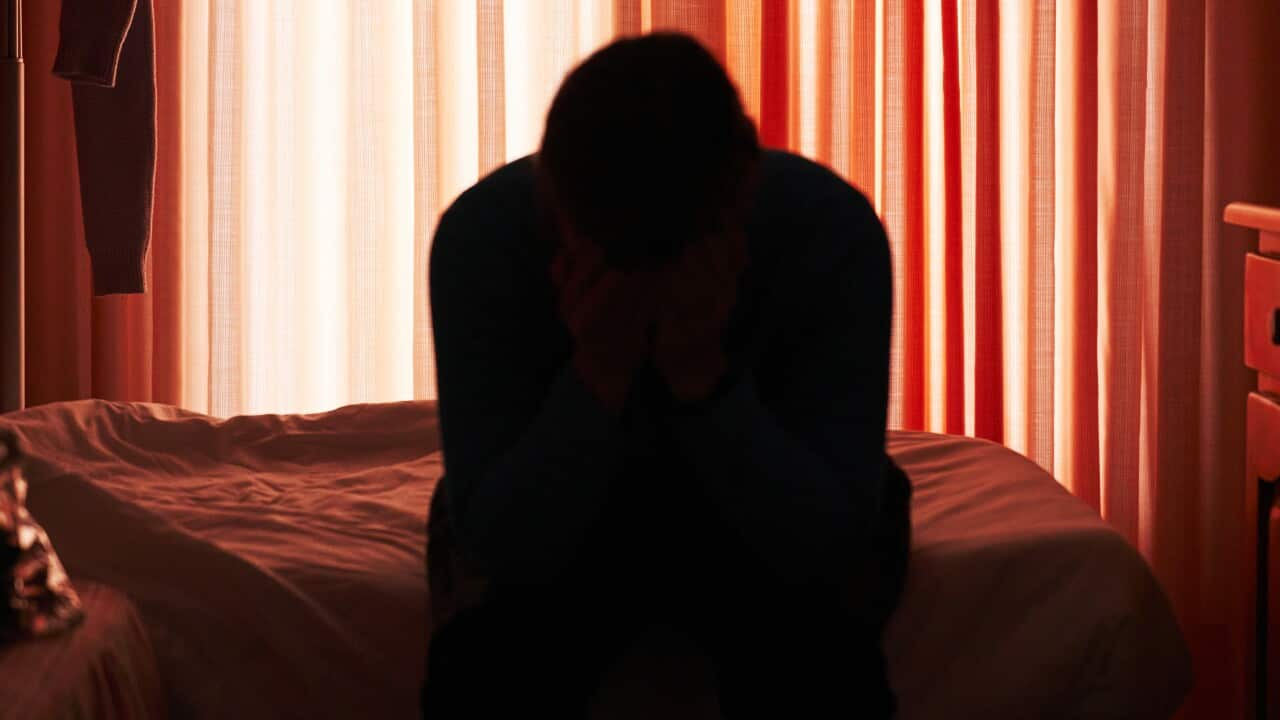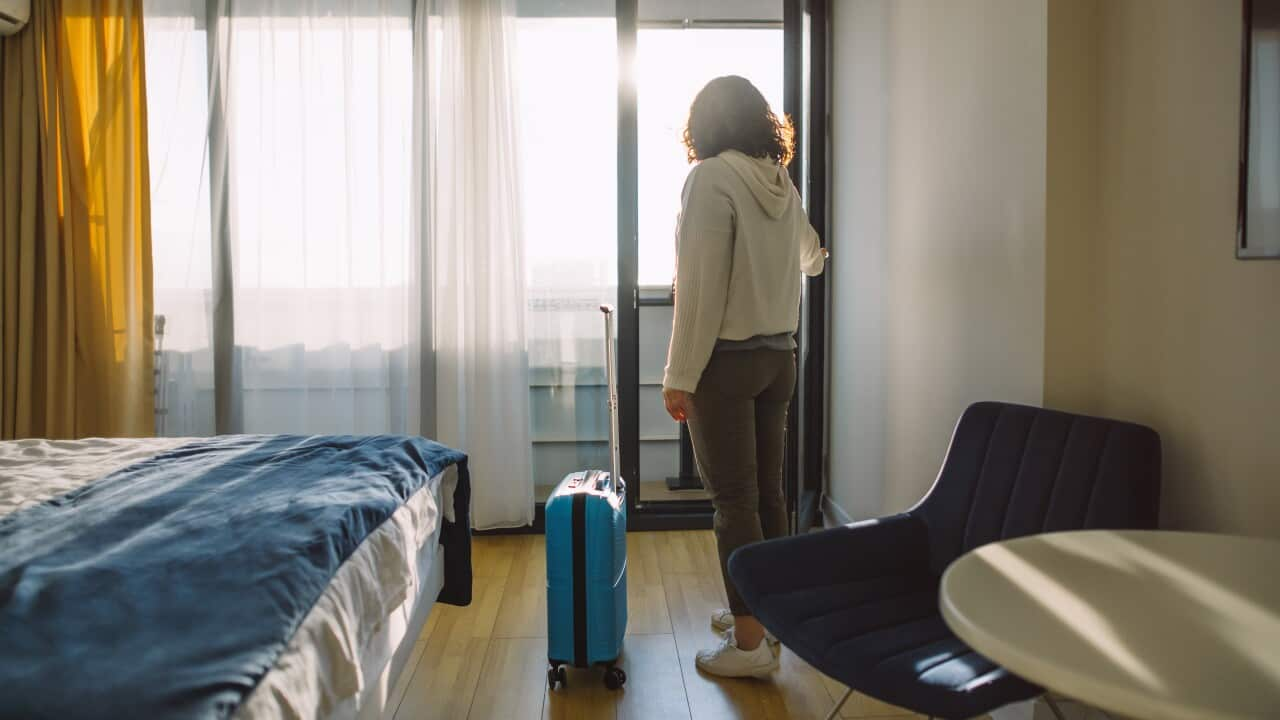This article contains references to gender-based violence.
Mia Bailey has been an online sex worker and content creator for 12 months — and says while she finds the job empowering, she has also experienced "petrifying" incidents.
The 20-year-old said women in the industry regularly experience violence, harassment, and intimidation — but that no-one is talking about it.
"It's never spoken about and not really anyone wants to talk about it," she said.
"For us as sex workers, it's just sort of swept under the rug ... I find it really petrifying."
Earlier this year, she was out celebrating her partner's birthday and waiting for some friends outside a venue when a group of middle-aged men recognised her from her online content.
She said they approached her and it started as a friendly encounter, but the men then asked her to leave with them to "make a video".
"I was like, 'No, please leave me alone, I'm not very comfortable, I'm not making a video with you,'" she said.
"Then it sort of escalated and it became, 'No, you are coming with us and you are making a video,' and I was grabbed and they were ordering an Uber to take me with them."
She said a family friend was nearby and stepped in when they realised what was happening.
She believes if her friend had not been there, she would have been forced into leaving with the men.
'We are viewed as objects'
This was not the only time Bailey has felt unsafe since joining the sex industry.
In another instance, she said other drivers recognised her and yelled, beeped, and gestured at her for 25 minutes while she was driving.

Mia Bailey says she has experienced several "petrifying" incidents since becoming an online sex worker. Source: Supplied / Mia Bailey
"It's disgusting and it's frightening in a way ... they think that it's okay because you are this sex symbol or whatever, or you are asking for it because of what you do as a job."
Bailey said she had also been blackmailed on Instagram by a user who had found out details about her partner and family and threatened to send a sexually explicit video to her 14-year-old brother.
Bailey said she, her friends, her manager and her agency all reported the user to Instagram but it took several attempts, rejections and appeals before it was finally deleted.
SBS News has contacted Instagram's parent company Meta for comment.
'Left out' of national conversation
In April, Prime Minister Anthony Albanese acknowledged Australia was in the midst of a gender-based violence crisis.
Thirty-five women have been violently killed in Australia since the start of the year, according to the advocacy group Destroy the Joint's project Counting Dead Women.
The federal government has announced a suite of measures designed to support women, including the National Plan to End Violence against Women and Children, and the Leaving Violence Program.
The government has also outlined targeted investment into universities, funding for legal services, and legislation to ban deepfake pornography and reduce exposure to violent pornography.
But sex workers say they have been left out.
Quinn Everly has been in the sex industry for eight years. She now creates online content and owns a talent management agency.
"I haven't seen or heard a mention of sex workers in these conversations [about women's safety] at all, so I think it's clear they have been left out," Everly said.
"I think we are somewhat uniquely qualified to comment on this kind of thing because we experience so much harassment and aggression and violence from men that I think we should be part of the conversation."

Quinn Everly has been in the sex industry for eight years and says workers "constantly" experience violence and harassment. Source: Supplied / Million Billion Media
"There seems to have been this unquestioned assumption that porn does drive violence against women, and we reject that completely," Pony said.
"We're also concerned that this places the blame of men's behaviour and attitudes towards women at the feet of sex workers, but also deflects from men's responsibility in this area."
Researchers have examined the link between pornography and violence. A 2020 study by La Trobe University .
But it is not definitively known whether it increases the likelihood of sexual violence.
Is sex work legal in Australia?
Sex work has been decriminalised in Victoria, NSW, and the Northern Territory, but some regulations still apply through local government authorities.
In the ACT and Queensland, sex work has not been fully decriminalised, but some forms are legal and regulated under a licensing system.
In Tasmania, brothels and escort agencies are illegal, but it is legal for two sex workers to operate together as self-employed sex workers, provided neither is managing the other.
In Western Australia, brothels are illegal, but private sex work is legal. In South Australia, all aspects of sex work remain criminalised.
How common is it for sex workers to experience violence?
Wayne Morgan is an associate professor at the Australian National University College of Law with expertise in law and sexuality, including regulation of sex work.
He said it's difficult to gather exact numbers about the extent of violence against sex workers due to a lack of research and under-reporting of incidents.
"Often we have to rely upon the anecdotal stories that sex workers tell, which of course are really important and should be listened to," he said.
When it comes to reporting incidents or seeking help, Pony said many sex workers do not report violence or other crimes because of the discrimination or legal repercussions they may face.
"At times when sex workers go to report crimes that have been committed against us, either we're not believed, or we're not seen as reliable witnesses, or we're told things like, 'What did you expect would happen as a sex worker?'" they said.
"There's also the chance in some jurisdictions if we do disclose that we're a sex worker, we're criminalised because of that and could potentially be arrested."
Some sex workers face additional barriers
While some sex workers — like Bailey — feel empowered in their industry, others can be trapped, trafficked and exploited.
These women are often more likely to experience violence and difficulties accessing help, Morgan said, particularly if they have come to Australia from another country and could face deportation.
"If somebody has been trafficked or coerced, it makes it even more difficult — in fact, in most cases, probably impossible — for them to then report violence or sexual assault or rape that they have experienced," he said.
"[For] non-English speaking women, women from other countries who have been trafficked or maybe they've come to Australia for other reasons and somehow found themselves in this industry, the barriers for them are immense."
In October, the Department of Home Affairs released a review into the exploitation of Australia's visa system, which found temporary migrants working in the sex industry were particularly vulnerable to exploitation.
Morgan said decriminalising sex work and enforcing laws against trafficking, exploitation and sexual assault would improve workers' safety.
"It is those laws that should be enforced rather than laws against sex work," he said.
"Sex work is not the problem; the problem is the coercion, the lack of consent or the trafficking, and we have criminal laws to deal with all of those issues ... but they're not always enforced and they're not always easy to enforce."
'People view us as complicit'
Pony said Scarlet Alliance would like sex work to be decriminalised across the country, and for anti-discrimination protections to be introduced.
Current anti-discrimination laws only protect people if they are discriminated against on certain grounds, which vary in each jurisdiction and only apply to legal sex work.
"The model regime is decriminalisation, and that means that work health and safety regulations apply, industrial regulations apply ... all the laws that apply to any other business [would] apply to sex workers," Pony said.
"We also advocate for the need for strong anti-discrimination protections because we know that sex workers face extremely high levels of stigma and discrimination."
They would also like more funding for peer organisations and increased access to financial services.
Social Services Minister Amanda Rishworth said the government's National Plan "recognises that sex workers can be exposed to gender-based violence in personal or work settings, and may also face barriers in reporting, accessing services or getting justice".
"Importantly, policies and programs funded under the National Plan ... do not discriminate based on occupation. They are open and available to the people that need them," she said in a statement.
Everly believes sex workers "constantly" experience sexual assault, harassment and aggression, but are often viewed as being "part of the problem".
While she would like to be included in national conversations, she said she is glad to see the government taking action on the broader issue.
"I think that a lot of people view us as complicit in the culture of violence against women and sexual harassment ... so that's probably why we're not included in the conversation," she said.
"Of course, I would like to see us included, but I don't want to do anything to detract from positive progress; I think we have to acknowledge when the government's trying to do something.
"What they're doing is important."
If you or someone you know is impacted by family and domestic violence, sexual harassment, or sexual assault, call 1800RESPECT on 1800 737 732 or visit . In an emergency, call 000.

















